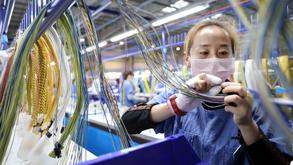 In this undated photo, an employee assembles a wire harness at the workshop of Draexlmaier (Anshan) Wire Harness System Co in Anshan, Liaoning province. The plant is one of the five in China operated by Germany-based Draexlmaier Group. (YAO JIANFENG / XINHUA)
In this undated photo, an employee assembles a wire harness at the workshop of Draexlmaier (Anshan) Wire Harness System Co in Anshan, Liaoning province. The plant is one of the five in China operated by Germany-based Draexlmaier Group. (YAO JIANFENG / XINHUA)
China's newly enacted rules on foreign investment security reviews are to safeguard national security and won't put an unnecessary burden on normal foreign businesses, the Ministry of Commerce said on Thursday.
"Carrying out security reviews on foreign investments that affect or may affect national security is a regular international practice. Major economies have already set up or are improving such security review mechanisms," said Gao Feng, spokesman for the Ministry of Commerce.
China's actual use of foreign direct investment surged 31.5 percent year-on-year to 176.76 billion yuan (US$26.07 billion) in the first two months of this year
The country's new rules, which took effect in January, concentrate on security reviews of foreign investment in military and other areas concerning national defense and security, as well as major agricultural, energy and resources areas that are critical to national security.
The new rules are in line with the requirement of the Foreign Investment Law, and provide a necessary guarantee for the stable and sound development of the Chinese economy, he said, adding that they are also conducive to the growth of foreign companies in China in the long run.
READ MORE: Court ruling suspends US ban on investment in Xiaomi
It is not a protectionist move or a refusal to further open up. Instead, it accords with the nation's commitment to opening-up on all fronts and aims at reinforcing the security mechanism for opening-up, said Hao Hongmei, deputy director of the foreign investment institute at the Beijing-based Chinese Academy of International Trade and Economic Cooperation.
While encouraging and protecting foreign investment, the rules should prevent and tackle national security risks at a higher level, she said, noting that opening-up without security safeguards is unsustainable in the long run.
ALSO READ: Foreign ministry condemns US sanctions
Gao, from the Commerce Ministry, said the government will continue to strengthen services for key foreign-funded enterprises and projects, and help accelerate the infrastructure construction of foreign-funded projects this year.
China's actual use of foreign direct investment surged 31.5 percent year-on-year to 176.76 billion yuan (US$26.07 billion) in the first two months of this year
In the meantime, Gao said the country will also expand the level of protection for foreign companies' legal interests and implement working measures on complaints by foreign-invested companies, while continuously updating China's Foreign Investment Guide to build a transparent and convenient investment environment.
Despite the challenges brought by the COVID-19 pandemic and the global economic recession, China's actual use of foreign direct investment surged 31.5 percent year-on-year to 176.76 billion yuan (US$26.07 billion) in the first two months of this year, according to the ministry.
Nathan Stoner, vice-president of Cummins Inc, a United States-based engine manufacturer, said that the company's research and development facility, involving a total investment of $250 million, will become operational in Wuhan, Hubei province, by the end of this year.
Policies introduced
"China has continuously introduced new policies to optimize its business environment and the Chinese market has already become a powerful driver of the company's global performance," said Stoner.
The US company sold more than 670,000 engines in China last year, an increase of 24 percent year-on-year, and the company's highest growth since it entered the Chinese market in 1975.
With the Ministry of Commerce announcing in November that it will develop its first dedicated five-year plan on the utilization of foreign investment for China's 14th Five-Year Plan (2021-25) period, the government will provide more support for specific projects invested by global firms, such as fast-track approval and subsidies for land and energy costs, according to a study released by international advisory company Brunswick Group.



